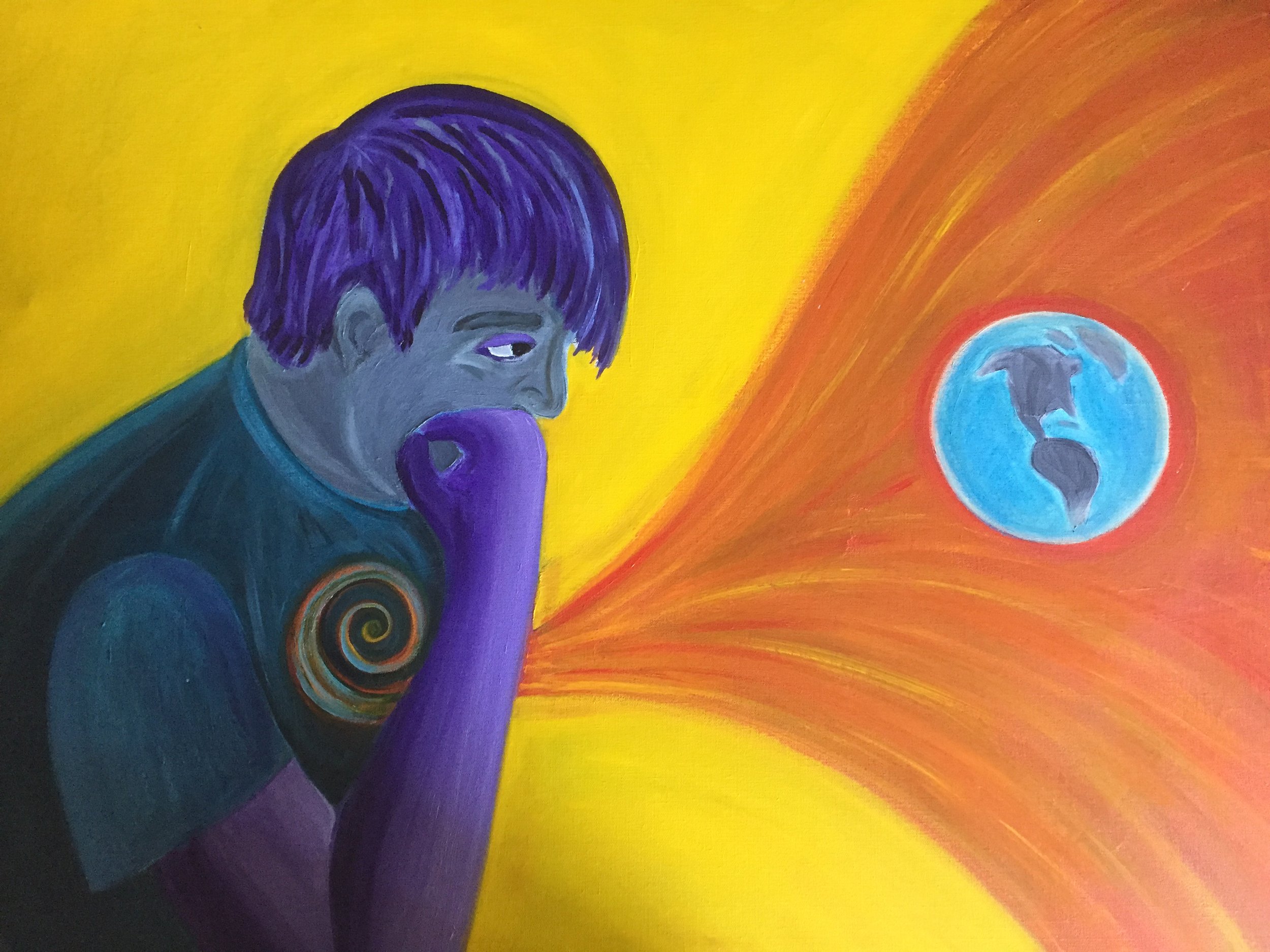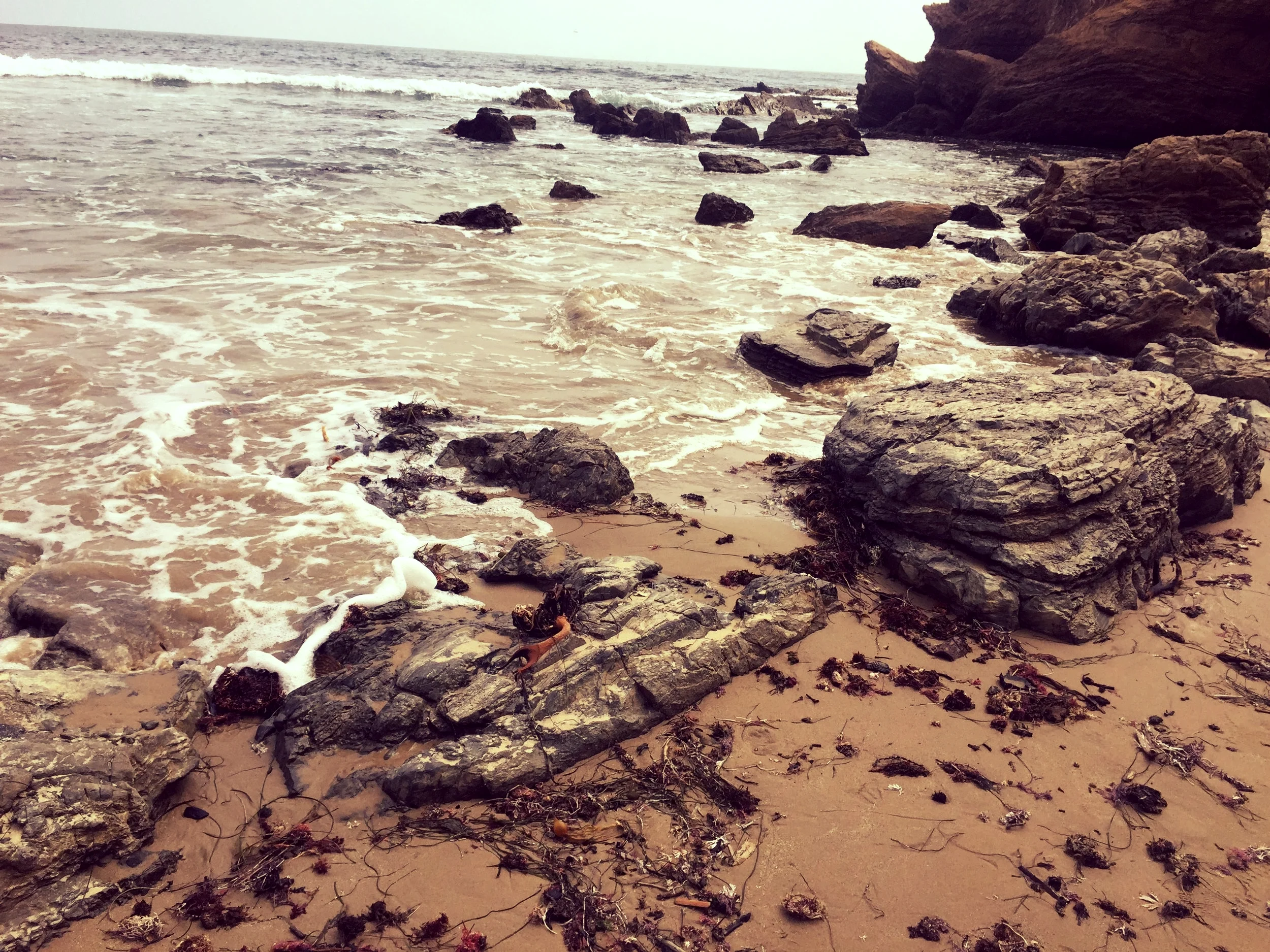Colonialism (Queerphobia) has 'Dis-abled' me
Image: A self-portrait I created for my high school senior project depicting a “hunched over” figure with purple hair, a dark teal shirt, and gray/purple skin looking forward at an image of the Earth. The Earth is surrounded in a fiery expanse that whirpools into the internal space of the figure.
Every day I have to try to remind myself to stand with my forearms pressed against the corresponding corners of a wall, so that I can improve my posture. It’s hard to get out of bed sometimes and do it. Every day I have to try to retrain my mind from catastrophizing, of foolishly attempting to rationally predict ‘the worst.’ It is through these (meta)physical processes that I have formed insights into ‘who I am,’ accepting that my existence is resistance.
My parents had to tell my adolescent self to fix my posture, to stand up straight. I was “hunched over,” not wanting to be seen; I walked sideways “like an airplane,” diverting my path from others in hopes of not having to risk interaction (which I evidently internalized could pose a reasonable danger to my ‘queer’ ‘neurodivergent’ personhood). My body had become trained toward aversion, its physical language told a story of desiring invisibility and non-existence.
Because body, mind, emotions, and spirit are interconnected, I naturally became ‘dis-abled’ by colonialism (of which Christianized cis-allo-amato-hetero-normativity is inherent). My inability to function as abled and productive has been attributed to my (over)sensitivity, implying that the (meta)physical bombardments of colonialism have hit me harder than they have others because of ‘who I am.’ Yet, I am unsatisfied with merely conceding to this conclusion.
Rather, from the vantage point of my everyday ‘dis-abled’ state, the dangerous ability of the colonial system to assert objective authority to demarcate the ‘dis-abled’ as dysfunctional non-productive and the ‘abled’ as functional productive toward the continuation of (unsustainable) mass exploitation is exposed. Thus, while I am ‘dis-abled’ under the colonial system, I do not uphold ‘abled’ supremacy—the concept itself has been defined in assimilative terms.
Just as Western ‘criminal justice’ discourse is inherently based in colonizing agendas of control through policing and incarceration, Western disability discourse similarly advances colonialism through its dependence on pathologizing diagnoses and plans of treatment, basing its notions of health or wellness in adherence to ‘functionality’ and ‘productivity’ within the colonial world. As stated by Ameil J. Joseph (2013) in regard to mental health discourses:
Psychiatric interventions have a long history of using biomedical diagnoses and treatments in order to exercise control over socially constructed marginalized groups (class, ability, race, gender, sexuality) by medicalizing deviance; or to control for the dominantly desired social behaviour and to advance colonial projects.
Through this recognition, we can, as stated by Merrick Daniel Pilling (2020, pg. 50), “expose and resist the ways in which pathologization is reconfigured as care” by the colonial medical system for ‘the unhealthy’ or ‘the dis-abled,’ similar to how policing and incarceration are reconfigured as just treatment or punishment for ‘the criminal,’ who is always already racialized and imagined as deviant to the neutral and (even) benevolent colonial status quo.
The colonial medical system has thus been (re-)identified as the Medical-Industrial Complex (MIC), first by Health/PAC in 1969, to highlight “the complexity of U.S. health care, its connections with and support by the state, and its industrial, for-profit character” (Burlage and Anderson 2018, pg. 70). This healthcare model “flexibly coupled with ideas of race and development” has been circulated and re-patterned throughout the world (Anderson 2006, pg. 233).
In this context then, my queer hunched body and catastrophizing mind can be read as symbolic of ‘dis-ability,’ yet I do not leave them unstirred as individualized problems separable from the contexts of modern colonial existence. Rather, I understand how they have been constituted within it and how I must manage them as a form of everyday survival and resistance. Ambrose Kelly (2014, pg. 163) contextualizes this within trans experiences:
However, while our identities are being normalized, our resistance to transphobia is increasingly being separated out from our identities and pathologized. Instead of being trans people who creatively survive transphobia, we are trans people with anxiety disorders, anger disorders, bipolar [disorder], schizophrenia. Our basic identities are less and less considered a “mental illness,” but our strategies for surviving are being taken out of context and individualized as “mental illnesses.” So that, to me, is the big shift that I see happening.
Even as the queer’s ‘identity’ may reflect a transition out of dis-ability discourse, the symptoms of living under colonial authority (including queerphobia) are still pathologizing us. The Western colonizing worldview was always too limited; its imagination too fragmented to acknowledge, encourage, or guide ‘queers’ like us who were dis-integrated by colonialism, having been unwoven, our teachers massacred, and us, persecuted into silence for generations.
On the journey of social ‘reclamation,’ decoloniality and queerness eventually became (re-)orienting terms for us, words that could help us move toward horizons of thriving life for all our relations. Through this reflective process it becomes apparent that my life (and life itself) is, always and forever, beyond colonial meanings—always beyond its pursuit to designate, control, and manage the universe in accordance with its (ir)rational supremacist vision.
Does this not then call for a reconstitution, deconstruction and, ultimately, transcendence from dominant notions of dis-ability?; where we are not measured or categorized by our perceived ‘ability’ to function within an exploitative unsustainable system?; where our notions of health and wellbeing are centered on our collective interconnectedness as lifeforms always in relation to one another as part of the universe?
Bibliography
Anderson, Warwick. Colonial Pathologies: American Tropical Medicine, Race, and Hygiene in the Philippines. Durham: Duke University Press, 2006.
Burlage, Robb, and Matthew Anderson. "The Transformation of the Medical-Industrial Complex: Financialization, the Corporate Sector, and Monopoly Capital." In Health Care Under the Knife: Moving Beyond Capitalism for Our Health, 69-82. New York City: Monthly Review Press, 2018.
Joseph, Ameil J. "A Prescription for Violence: The Legacy of Colonization in Contemporary Forensic Mental Health and the Production of Difference." Critical Criminology 22, no. 2 (2013), 273-292. doi:10.1007/s10612-013-9208-1.
Kelly, Ambrose. "Trans Jeopardy / Trans Resistance: Shaindl Diamond (SD) Interviews Ambrose Kirby (AK)." In Psychiatry Disrupted: Theorizing Resistance and Crafting the (R)evolution, edited by Bonnie Burstow, Brenda A. LeFrançois, and Shaindl Diamond, 163-176. Montreal: McGill-Queen's Press, 2014.
Pilling, Merrick D. Queer and Trans Madness: Struggles for Social Justice. Basingstoke: Springer Nature, 2022.


![In Praise of -Less: [transMad shouts from absent (pl)aces]](https://images.squarespace-cdn.com/content/v1/5610dfd1e4b0c37386dd0a90/1659648499809-1LC9XWPOEZRJ99E5EME0/FACES.png)


